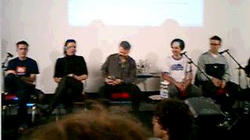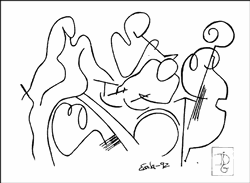|
This is my dynamic, frequently updated homepage. This is a NewsLog, also known as a WebLog or Blog.
Everything is evolving, so don't assume too much.
People to watch:
Adina Levin
Andrius Kulikauskas
Britt Blaser
Catherine Austin Fitts
Chris Corrigan
Clay Shirky
Dan Gillmor
Dave Pollard
David Allen
David Weinberger
Dewayne Mikkelson
Dina Mehta
Doc Searls
Elisabet Sahtouris
Elizabeth Lawley
Euan Semple
Florian Brody
Frank Patrick
Gen Kenai
George Dafermos
George Por
Graham Hancock
Greg Elin
Hazel Henderson
Heiner Benking
Inspector Lohman
Jean Houston
Jerry Michalski
Jim McGee
Jim Moore
John Abbe
John Perry Barlow
John Robb
Joi Ito
Jon Husband
Jon Lebkowsky
Jon Udell
Jonathan Peterson
Judith Meskill
Julian Elvé
Julie Solheim
Kevin Marks
Lawrence Lessig
Leif Smith
Letecia Layson
Lilia Efimova
Lisa Rein
Marc Canter
Mark Oeltjenbruns
Mark Pilgrim
Mark Woods
Martin Dugage
Martin Roell
Mary Forest
Matt Mower
Max Sandor
Michael Fagan
Mike Owens
Mikel Maron
Mitch Kapor
Mitch Ratcliffe
Nathalie dArbeloff
Netron
Noam Chomsky
Paul Hughes
Peter Kaminski
Phil Wolff
Philippe Beaudoin
Ray Ozzie
Raymond Powers
Rebecca Blood
Roger Eaton
Roland Tanglao
Ross Mayfield
Scott Lemon
Sebastian Fiedler
Sebastien Paquet
Skip Lancaster
Spike Hall
Steven Johnson
Stuart Henshall
Thomas Burg
Thomas Madsen-Mygdal
Thomas Nicholls
Timothy Wilken
Todd Suomela
Tom Atlee
Tom Munnecke
Tom Tomorrow
Ton Zijlstra
Lionel Bruel
Loic Le Meur
Nancy White
Mark Frazier
Merlin Silk
Robert Paterson
Colby Stuart
Nova Spivack
Dan Brickley
Ariane Kiss
Vanessa Miemis
Bernd Nurnberger
Sites to watch:
Edge
Junto
Absara
Rhizome
Nanodot
HeadMap
Openworld
FutureHi
Imaginify
Do No Harm
BoingBoing
Smart Mobs
Webcamorama
MetaFilter
NotThisBody
Disinfopedia
YES Magazine
Collective Web
WorldChanging
Disinformation
Escape Velocity
Space Collective
Friendly Favors
Emergent by Design
Independent Media
Global Ideas Bank
Forbidden Science
Greater Democracy
ThoughtsOnThinking
Disclosure Project
Explorers Foundation
Manufacturing Dissent
Collective Intelligence
Action without borders
Free Expression Network
Co-intelligence Institute
Electronic Frontier Foundation
French:
Emmanuelle
Manur
Elanceur
Loeil de Mouche
IokanaaN
Blog d'Or
Le Petit Calepin
GeeBlog
Absara
Guillaume Beuvelot
Ming Chau
Serge Levan
Jean Michel Billaut
C'est pas Mécanique

I live in Toulouse, France where the time now is:
01:06
Unique Readers:

Primarily
Public Domain
Everything I've written here is dedicated to the
Public Domain.

The quotes from other people's writings, and the pictures used might or might not be copyrighted, but are considered fair use. Thus, overall, this weblog could best be described as being:
Primarily Public Domain. |
Syndication:
 ![Validate my RSS feed [Valid RSS]](http://www.newciv.org/pic/valid-rss.png)
|
| Sunday, February 16, 2003 |  |
|
|
|
 Below is an article I wrote a number of years ago about how the money system works and what is wrong with it. Maybe I'd put more nuances in it today, but I still believe it is basically correct. Most people don't really have any clue about money and think it is being 'made' by doing good work. It isn't. It is being made by borrowing it from somebody who doesn't have it, but who invents it out of thin air. Which I think is alarming. I'm no economist, but I haven't heard anybody educated in economics challenge this. The feedback I've mostly gotten from experts is that it all doesn't really matter. Anyway, read on... Below is an article I wrote a number of years ago about how the money system works and what is wrong with it. Maybe I'd put more nuances in it today, but I still believe it is basically correct. Most people don't really have any clue about money and think it is being 'made' by doing good work. It isn't. It is being made by borrowing it from somebody who doesn't have it, but who invents it out of thin air. Which I think is alarming. I'm no economist, but I haven't heard anybody educated in economics challenge this. The feedback I've mostly gotten from experts is that it all doesn't really matter. Anyway, read on...
"Some of the problems with our prevalent economic system as I understand it is this:
Money is created by banks. In part by central banks who can make up amounts and lend them out, mainly to central governments, but also to regular banks.
The worst problem is not that the central banks are mostly outside the control of any elected representatives of the population, even though that is certain cause for some suspicion and alarm. In some areas, such as the U.S., the central bank is a completely privately owned institution, owned by its member banks. The central bank of central banks, the Bank for International Settlements in Basel Switzerland, is also not controlled or owned by any government, but is a corporation with stocks. It is located on land that is not considered part of Switzerland or any other country, it is not answerable to any public body, and it does its business in secret.
However, the worst problem is that interest is being charged for the money that is lent out. It might well be a good idea to use fiat money, that is, money that doesn't have any inherent value, but is only valuable because we trust that it is. All currencies on the planet are, as far as I know, fiat money. However, the problem is the interest.
[ Information | 2003-02-16 16:49 | | PermaLink ] More >
|
|
|
|
 Few people seem to be aware of the existence of the Bank for International Settlements, also known as the BIS Bank. It is the central bank of central banks, located in Basel, Switzerland. It is no longer quite as unknown and hidden as it was. It has its own website now. When I last searched on the web there were only a few hundred entries about it, but now there's a lot more. The article below, 'Ruling the World of Money' which you also find here, is 20 years old, but gives a good overview of what the BIS bank is about. Few people seem to be aware of the existence of the Bank for International Settlements, also known as the BIS Bank. It is the central bank of central banks, located in Basel, Switzerland. It is no longer quite as unknown and hidden as it was. It has its own website now. When I last searched on the web there were only a few hundred entries about it, but now there's a lot more. The article below, 'Ruling the World of Money' which you also find here, is 20 years old, but gives a good overview of what the BIS bank is about.The membership of this club is restricted to a handful of powerful men who determine daily the interest rate, the availability of credit, and the money supply of the banks in their own countries. They include the governors of the U.S. Federal Reserve, the Bank of England, the Bank of Japan, the Swiss National Bank, and the German Bundesbank. The club controls a bank with a $40 billion kitty in cash, government securities, and gold that constitutes about one tenth of the world's available foreign exchange. The profits earned just from renting out its hoard of gold (second only to that of Fort Knox in value) are more than sufficient to pay for the expenses of the entire organization. And the unabashed purpose of its elite monthly meetings is to coordinate and, if possible, to control all monetary activities in the industrialized world.
[ Culture | 2003-02-16 16:49 | | PermaLink ] More >
|
|
| Saturday, February 15, 2003 |  |
|
|
|
 One of the fields of interest that most captivates me is how people get together in useful ways. That might sound very vague to some, but that is in part because the vital components of 'how people get together' aren't apparently known. There's no widespread technology or fundamental protocol for how a group activity forms from the bottom up. How some people notice that they share a certain *something*, and they then organize themselves such as to allow that *something* to emerge further, and they figure out what they actually want to do, and how. And then they do it. One of the fields of interest that most captivates me is how people get together in useful ways. That might sound very vague to some, but that is in part because the vital components of 'how people get together' aren't apparently known. There's no widespread technology or fundamental protocol for how a group activity forms from the bottom up. How some people notice that they share a certain *something*, and they then organize themselves such as to allow that *something* to emerge further, and they figure out what they actually want to do, and how. And then they do it.
There is quite a bit of a system for it when it comes to business ventures, companies, or any venture where one party comes up with the money that makes it happen. Even if nobody has the money, there's a pretty clear approach. You write a business plan, which includes deciding what you're going to do, who's going to do it, why it's a good idea, and what resources you need to do it. And then, typically, you'll try to convince somebody to provide the funds for doing it. And, if you succeed, then either you start doing it, or you make a new plan for what you really want to do. Either way, the money flows in a hierarchical way which supports a system of somebody above you telling you what you ought to do, and you feeling compelled to do it, because the money is good and you need it to eat and pay rent. And you use contracts money to sort of tie the pieces together. That system has proven itself to work, even though it has faults.
I don't think what I'm interested in will boil down to business plans and financing and who's the boss. Although maybe some of the pieces are partial answers. What I'm looking for is what will help it happen where there's noone clearly in charge, and no clear source of funding, and therefore no obvious hierarchy. And if hierarchy isn't really desired. I'm looking for how a grassroots group comes together. I'm looking for how free people, who don't feel an urgency to sell their soul, but who have a desire or a passion, or who see a need - how they come together.
If the desire or the need is strong enough, and the situation at hand is clear enough to everybody, self-organization might happen instantly and effectively. If millions of people love watching Farscape on the Sci-Fi channel, and they suddenly cancel it, thousands of those will feel strongly enough about it to do something about it, and the task is sufficiently clear that they can self-organize. And they did.
I suppose I'm looking for tools that will facilitate the clarification of what we're talking about, what we might agree on doing, and how we're open to doing it. If the need is not perceived as an emergency, and the task isn't already very simple, we will have to negotiate each step, and remain in alignment all the time, or each of us will just go back to doing something else we find compelling.
I'm looking for a language or a protocol or a tool or a metaphor that helps a matching process to happen. Kind of like how an antigen has very specific receptors that will make it physically match together with certain kinds of things that it is meant for attaching itself to, and it won't fit with other things. I'd like some ways for people to become more clear on what receptors we have, so we can better fit our receptors together where they fit, and not waste too much energy on where they really don't fit.
[ Organization | 2003-02-15 14:12 | | PermaLink ] More >
|
|
|
|
 No problem getting together here. Peace demonstrations everywhere this weekend. Biggest ever. A million people in Rome, 1.3 million in Barcelona, 2 million in Madrid, 250,000 in New York, 1 million in London, 1/2 million in Berlin. And this time it seems totally impossible to keep it out of the U.S. media, so I think even Bush might catch it on TV. No problem getting together here. Peace demonstrations everywhere this weekend. Biggest ever. A million people in Rome, 1.3 million in Barcelona, 2 million in Madrid, 250,000 in New York, 1 million in London, 1/2 million in Berlin. And this time it seems totally impossible to keep it out of the U.S. media, so I think even Bush might catch it on TV.LONDON/NEW YORK (Reuters) - More than six million demonstrators turned out across the world on Saturday in a wave of protest supporting international leaders in urging the United States not to rush into a war against Iraq.
From Canberra to Cape Town, from Karachi to Chicago, people from all walks of life took to the streets to pillory President Bush as a bloodthirsty warmonger in the biggest demonstration of 'people power' since the Vietnam War.
The largest outcry against war occurred in the European countries whose leaders have vocally supported Bush's position at the United Nations....
[ News | 2003-02-15 14:45 | | PermaLink ] More >
|
|
|
|
 Nice event this evening in L.A. Chinatown. Actually the first face-to-face blogging event I've been to, now I think of it. Nice to shake Doc Searls' hand, and nice that he knew who I was and everything, him being pretty much the BlogFather. Xeni Jardin was the MC. Susannah Breslin of Reverse Cowgirl fame was the main motor behind this event happening in the first place. Her blog is an always entertaining read about porn and stuff. Mark Frauenfelder was there. The BoingBoing blog he created is, as it says, a directory of wonderful things, and before it was a blog it was a zine, and Mark was also involved with Wired. Evan Williams is the creator of Blogger, the most famous and used blogging program, with more than a million users, supposedly. He announced that his company Pyra Labs has just been bought by Google. And he demonstrated audioblogging by having an accomplice hold up his cellphone, which recorded what was being said and automatically posted it in a blog. Heather Havrilesky writes Rabbit Blog and is a journalist. Tony Pierce writes busblog and is a really funny 'normal' guy. Afterwards we hung out at Hop Louie's Pagoda. I met Allan Karl whom I just met virtually yesterday in Joi Ito's conference call. I talked for a while with Skip of eardrumbuzz who's doing very cool things with video sharing in his apartment building. All around a very pleasant evening. Except for that the pictures I took didn't turn out very well. Nice event this evening in L.A. Chinatown. Actually the first face-to-face blogging event I've been to, now I think of it. Nice to shake Doc Searls' hand, and nice that he knew who I was and everything, him being pretty much the BlogFather. Xeni Jardin was the MC. Susannah Breslin of Reverse Cowgirl fame was the main motor behind this event happening in the first place. Her blog is an always entertaining read about porn and stuff. Mark Frauenfelder was there. The BoingBoing blog he created is, as it says, a directory of wonderful things, and before it was a blog it was a zine, and Mark was also involved with Wired. Evan Williams is the creator of Blogger, the most famous and used blogging program, with more than a million users, supposedly. He announced that his company Pyra Labs has just been bought by Google. And he demonstrated audioblogging by having an accomplice hold up his cellphone, which recorded what was being said and automatically posted it in a blog. Heather Havrilesky writes Rabbit Blog and is a journalist. Tony Pierce writes busblog and is a really funny 'normal' guy. Afterwards we hung out at Hop Louie's Pagoda. I met Allan Karl whom I just met virtually yesterday in Joi Ito's conference call. I talked for a while with Skip of eardrumbuzz who's doing very cool things with video sharing in his apartment building. All around a very pleasant evening. Except for that the pictures I took didn't turn out very well.
[ Diary | 2003-02-15 23:59 | 0 comments | PermaLink ]
|
|
| Friday, February 14, 2003 |  |
|
|
|
Ross Mayfield did an excellent post on Distribution of Choice and another one on Ecosystem of Networks. I was sitting looking at his neat chart, wondering why I didn't really like it very much. Well, it is a good chart, and it shows what kind of audience weblogs might have in their different roles. I guess what I don't like is that it is not how I'd *like* things to work. Which is a bit hypocritical to talk about if we're talking about emergence at the same time, and this happens to be how things emerge. But it sort of indicates that what emerges from blogs is in the bigger picture the winner-take-it-all phenomenon of power-law distributions. The people who are first or who are popular will just get more popular. Which sounds like a U.S. election to me, but it doesn't really sound like what I think emerges from blogs.
So, I decided to make my own chart, coming from a totally different place. Maybe it looks crazy to anybody but me, but, hey, I gotta try.
So, here the point is that it starts with ME and the choices I make and what happens to them. So, if we're talking about blogs, there is first whatever I have the thought of writing about. I make some choices about what to write about. Let's say we consider each of those thoughts or choices a little bubble, and that those little bubbles naturally rise up in the information ocean.
I might have a small group of people I'm already working with, and we might use blogspace as a place to work on things. We share a project, and we either put our pieces together between our blogs, or we write about what we do from each our different angles. Blogging allows us to work more openly and refer to each other's work, while also sharing it with a bigger audience.
My blogging bubbles float up and get spread wider. People I don't know read my blog, and read various people's blogs, and we get attracted to each other. Connections form. It might just be that we read each other's stuff, or we link to each other, or we start talking in other ways. That becomes a good basis for forming new groups that can act together.
All of our bubbles, mine and those from other blogs, with the added value of our collective linking choices, will float up and into the cloud of the web. Specifically they will end up in an assortment of directories and search engines, most notably in Google.
And that is in part where there are interesting and new things going on. Not just that few people get most of the attention, but also that the choices of many relatively ordinary folks become more visible than ever before. And they form emergent patterns that become very visible.
For myself and my weblog of relatively modest popularity, I notice that many of the bubbles I set up rise to considerable size and power, because they're supported by others who choose to link to them. What interests me there is not so much how great I am at showing up in search engines, but how easily the collective opinion of (a group of) bloggers will show up prominently.
A rather random example is that I wrote a couple of little blog entries about Nestle doing some not very nice things. Now, if you do a web search on CNN or on Google on "Nestle sues Ethiopia", I'm number one. If you just want to know about "Nestle Corporation", I'm number four, before several of Nestle's own sites. Nestle last year made 5.5 billion dollars in profits, but yet you and I, by linking a bit to each other's posts, can compete very well with their web presence and influence public opinion. Not me, but us. It wasn't even my own info I posted.
The point is not at all whether I have unfairly more or less readers than some other weblog. The emerging democracy in blogs is in that we together leverage our choices in a way that normally isn't possible unless you run a big corporation or you're run by one. We're a swarm of thought bubbles.
[ Patterns | 2003-02-14 04:28 | | PermaLink ] More >
|
|
|
|
Today I participated in a very enjoyable conference call / chat / blogger event arranged by Joi Ito and using infrastructure from the socialtext team. The theme was 'emergent democracy', particular as it relates to blogs. Joi called it a 'happening' which is quite appropriate as it happened in several media at the same time. We were on the phone, 18 people or so, from Japan, U.S., Canada, England, France, and maybe somewhere I'm forgetting. And we were chatting online at the same time. And we used a WIKI as a place to coordinate the information. I really enjoy that kind of conversation that happens in a multi-dimensional way, even if it is sometimes hard to keep up with it all at the same time. But it gives everybody an outlet, even if we work in different ways.
Some threads in the discussion were about what emergence really is. Is it like ants who collectively appear more intelligent than they do individually? Are we having conversations or are we creating structure? And we talked about tools. What tools do we have? What tools might we invent that better might allow useful democracy to emerge? And I guess that's mostly what we converged around. An intention to continue working on coming up with better tools and better infrastructure. And to keep talking about what it might be that we ought to do.
[ Diary | 2003-02-14 21:58 | 0 comments | PermaLink ]
|
|
| Thursday, February 13, 2003 |  |
|
|
|
 I have often tried to come up with lists of perfect categories in one context or another. Right now one that works fairly well is the one you might see for example in New Civilization News in the right sidebar. There are more than 50 total, and usually I can find one that fits whatever I'm posting. But the categories I chose for my own weblog here no longer work. Most of the time none of the categories fit, so it is pretty haphazard what I choose. I have often tried to come up with lists of perfect categories in one context or another. Right now one that works fairly well is the one you might see for example in New Civilization News in the right sidebar. There are more than 50 total, and usually I can find one that fits whatever I'm posting. But the categories I chose for my own weblog here no longer work. Most of the time none of the categories fit, so it is pretty haphazard what I choose.
Part of the trouble with categories is that most of us don't really organize our lives around clinically neat categories. We don't really get passionately excited about sections of the yellow pages. We usually get passionate about more complex memes or about complex feelings we have inside or about specific activities we do with specific other people. I'm passionate about 'Emergent Social Systems', but even if a number of other people were willing to stand under that same banner, we probably wouldn't all agree on what it meant, or what fit under it, or what was really important about it. My own passion is a compass I steer by, which I can't even adequately describe in writing. If I could write it down, it would be pages long, rather than just a couple of words.
At first I thought that categories naturally and automatically would lead to group forming and collaboration and community. They don't. If several people choose the same category, chances are they'd be more likely to form a group than if they were put together randomly, but none of it is automatic. In NCN one of the first things I did was to announce a number of groups based on certain subjects. Alternative Energy Sources, Alternative Money Systems, Social Rules and Ethics, Spirituality, etc. A number of people joined each one, and there was some initial excitement. Then there were interested discussions for a couple of months. And gradually each of the groups died out. More people joined once in a while and sometimes revived them, but nothing much happened. Why? Because all they had in common was a category. They didn't have a shared outcome in mind, they hadn't agreed or committed to anything, and they didn't share any model for how to think about it, or how to go about it. And because nobody took the lead in making it happen, no matter what.
Categories are still very useful, and might help people find what they're looking for, and I'll probably still look for better and better categories to put on things. But when it comes to forming groups, I think we need to find ways of codifying outcomes, world views, and preferences, so that we might help match up people who actually fit together. And we need to turn on the spotlights, blow the trumpets, and roll out the red carpet the moment we notice that somebody actually is passionately driven to do something great. Because that is what the world is really organized around, whatever label we put on anything.
[ Organization | 2003-02-13 16:21 | | PermaLink ] More >
|
|
|
|
Gabe Andersokn mentions Ethnologue, which shows a matrix of what languages are spoken in what countries. I'm paying a lot of attention to languages right now because I'm trying to get up to speed to speak French.
[ Culture | 2003-02-13 23:59 | 0 comments | PermaLink ]
|
|
|
|
The Flash Mind Reader is all the rage today. It seems totally impossible for it to do what it does. I did it a bunch of times and couldn't figure it out. ...But it is ultimately fairly logical. You just need to question some assumptions you took for granted.
[ Knowledge | 2003-02-13 23:59 | | PermaLink ] More >
|
|
|
|
 Howard Rheingold mentions that it seems that the U.S. Congress has succeeded in shutting down the Total Information Awareness program. Howard Rheingold mentions that it seems that the U.S. Congress has succeeded in shutting down the Total Information Awareness program.Virtually without dissent, the House conferees accepted a bipartisan Senate provision written by Charles Grassley, an Iowa Republican, and Ron Wyden, an Oregon Democrat, stipulating that the program cannot be used against American citizens. The conferees also agreed to end research on the program — in effect shutting it down — in 90 days unless the Pentagon submits a detailed report on the program's cost, goals, impact on civil liberties and prospects for success against terrorists. What this means, in effect, is that if the program continues at all, it will be as a low-intensity research project under close Congressional supervision. Good news.
[ News | 2003-02-13 23:59 | | PermaLink ] More >
|
|
|
|
Question: "What proof do you have that Iraq has Weapons of Mass Destruction?"
Colin Powell: "We kept the receipts." That is a joke. But not all that much of a joke once you consider that the United States and Great Britain sold lots and lots of atomic, chemical and biological weapons material to Iraq, including rockets to deliver it with. See a list here of the companies involved.
[ Politics | 2003-02-13 23:59 | | PermaLink ] More >
|
|
|
|
 It is a widely held value that people can hold different opinions, and it is sort of good to agree to disagree. Particularly if it is political opinions. It is considered noble to respect people one disagrees with. It is a widely held value that people can hold different opinions, and it is sort of good to agree to disagree. Particularly if it is political opinions. It is considered noble to respect people one disagrees with.
But there are some qualities of opinions that most people don't notice. It is sometimes like comparing apples and oranges. Two opinions might be of a totally different order from each other, even though they are compared equally.
Let's take a politically and religiously very controversial issue like abortion. The typical way of presenting it is that there are two sides. For or against, basically. The people who think abortion should be legal and those who think it should be illegal. Those are not at the same logical level at all. Comparable choices would be to force all pregnant women to have abortions versus to allow no pregnant women to have abortions. Yes, that is ridiculous, but those would be logical opposites on the same playing field.
Or let's take opinions about whether it should be legal to smoke in public places or not. One side says that one should never be allowed to do so, or one would be fined or arrested. The opposite of that would be that one HAS to smoke in public places, or one would be fined or arrested. Ridiculous? Yes, indeed.
The point is that the choice of forcing everybody to always do something, or to never do something, that's a huge responsibility, and not just a matter of making a good point. You have to be responsible for it always, always, forever being the right choice. That's a real big thing. And it is fairly impossible, because you don't really know if it is always the right thing, because you probably can't imagine all the people and all the situations it applies it. So you probably just make the choice based on your own personal inclination right now, or your religious beliefs, or your idealistic political views, and you might vote for having that choice imposed on everybody all the time. And you sort of ignore the details, hoping that as a member of a government, you probably never have to be faced with those circumstances where that choice wouldn't be the right one.
So, in summary, the option that people are free to make their own reasonable choices based on the situations they find themselves in, that is not on equal footing with the option that they always have to do things the same one way, or that they never can do it a certain way.
People who believe in abortion rights do not necessarily plan on getting pregnant and getting an abortion. People who think there should be somewhere they can smoke, do not necessarily plan on smoking in all the very places that would be the most bothersome for non-smokers. They would maybe just like to be free to make some reasonable choices about it, based on the actual circumstances.
So, they're not equal opinions to have. If your option involves that I will be forbidden by force from exercising my option, but my option only is my personal choice, then our options are certainly not equal. Your option is clearly hostile to mine, but the reverse probably isn't true, even if you have trained yourself to think about it as if it is.
Most politicians don't realize the enormity of a decision to force something to be a certain way for everybody, particularly when we're talking about some sort of personal behavior or lifestyle choice.
To go to war and or not to go to war aren't equal either. They aren't just different opinions, different choices based on personal preferences. One will involve taking away the right to choose from hundreds of thousands or millions of people, because they will probably be killed. Sometimes that might make sense, if even bigger killing is avoided, but it is a very, vary hard decision, based on careful analysis of the facts. It isn't just some opinion to have.
Certain global choices don't really take anything away from anybody. Forcing all of us to drive in the right or the left side of the street, or to use 110V or 220V electricity, that is a matter of organization, and doesn't make any of us lose anything.
But a choice is a choice. Something an individual makes, or something that the people involved make in concert.
True bottom-up grassroots democracy consists of people making choices, and being quite likely to get what they're choosing. Many people will choose different things, and they will get different things. Enforcing the same choices on everybody should be avoided unless absolutely necessary.
[ Organization | 2003-02-13 23:59 | | PermaLink ] More >
|
|
| Wednesday, February 12, 2003 |  |
|
|
|
 My e-mail program is a constant element of annoyance in my life, because it doesn't do the things I'd need it to do, and I get way too much mail for it to work right. It is Eudora 5.2, which is a fine e-mail program as it goes, but I need a whole other level of functionality. These are things I need: My e-mail program is a constant element of annoyance in my life, because it doesn't do the things I'd need it to do, and I get way too much mail for it to work right. It is Eudora 5.2, which is a fine e-mail program as it goes, but I need a whole other level of functionality. These are things I need:
- I need to keep track of my correspondence with different people. It should be easy to immediately see all prior incoming and outgoing messages in chronological order between me and a certain other person.
- I shouldn't have to create special mailboxes and filters to do that.
- Some people have several e-mail addresses, and I might have several e-mail addresses. I still want to be able to see my conversations with one person in one place, no matter what address we used, and no matter how we spelled our name that day.
- When I get a message, my e-mail program should know whether this is somebody I know or not. Certainly it should know right away whether it is somebody I've ever exchanged e-mails with, and it should tell me somehow.
- It should preferably also know if it is a known member of some group I'm in. There are 7000 people in the NCN directory. I'd like my e-mail program to recognize one of those people if they write to me, even if we didn't exchange e-mail before.
- I'd like my e-mail program to have a reasonable assurance that an e-mail really is from the person it says it is. The SMTP protocol allows anybody to enter whatever they like as sender, so I need some kind of ID mechanism built in here.
- I need SPAM recognition that I can train, like Apple's Mail program. I don't want centralized anti-SPAM blacklists, because they work badly and block things that shouldn't be blocked.
- Any message that isn't from somebody I probably know, and that doesn't have proper digital ID, should go into a totally different place than messages that are from real people.
- I need to be able to put a given message into any number of folders at the same time, without creating several copies. I need more dimensions. I want to always remember that a certain message was sent or received, so in principle it shouldn't actually leave my outbox or inbox, but at the same time I might want to file it under several different subjects, and give it various flags, and find it according to any of those keys.
- I want statistics. How many messages do I get per day, how many did I answer, how many did I send, etc.
None of those things are overly hard. Hardest part is probably the digital ID. The rest I could probably program myself, if I had a few weeks with nothing else to do, which isn't very likely. I need similar things for my Instant Messager programs. Actually I want continuity in my conversations across several different applications and platforms. Has anybody solved these things well in a program I don't know about?
[ Technology | 2003-02-12 18:01 | 0 comments | PermaLink ]
|
|
|
|
 Peter Kaminski on Greater Democracy: Peter Kaminski on Greater Democracy:"Do you think government could be run better?
Then how could you not blog right now?
Blogs are a combination of Revolutionary musket, Martin Luther's theses, Poor Richard's Almanack, and Paul Revere's ride.
How could you not seize a musket when offered, or hold the nail and mallet and pound your broadside onto the Wittenberg church door?
How could you not turn the crank on Ben Franklin's printing press, or swing up onto Paul Revere's horse?
Blog. Blog to your family, and blog in the communities where you hold thought leadership. Tell the world it must change, and how you think it should.
The tools of change are at hand today -- they're simple, and Revolutionary, right now. I happen to be a toolsmith, and I'm working with everything I've got to make them more powerful and more widespread, as are many others. But the time to start is now.
Blog. Blog now. Tell the world it must change, and how you think it should."
[ Information | 2003-02-12 21:04 | | PermaLink ] More >
|
|
|
|
 Mitch Ratcliffe: Mitch Ratcliffe:"Individuals need to rise up and sieze the power they have always had and been urged to forget. Beyond voting, we need to organize and actively debate everything, from the sidewalks in our home towns to the bills before Congress and the ad hoc rulings from the executive branch. We need a parallel government that forces the attention of politicians back to the people and away from the monied interests.
Why would this work? Because politicians go where the power is and money is merely a proxy for power and time (because you can buy people's time or their attention through broadcast media). An active populace, a Jacksonian revival, with a thousand Lincolns spinning homely leadership, and a thousand Dr. Kings igniting our indignation toward arbitrary exercises of power by something called "the majority" would erase the proxy power of lobbyists and career representatives of big contributors and drive the return of an American dialog.
We should use the connections to establish parallel governments at every level, until the governments adopt the dialog by default, which they will do, because American government is still by people and for people at its roots. There are good people in government, and a lot of snails and weasels, too. Give the dedicated civil servant and the earnest legislator a constituency and they can change things in weeks, even days. Decisions can and will be made based on the will of the people through informed and open debate."
[ Organization | 2003-02-12 21:13 | 0 comments | PermaLink ]
|
|
|
|
 Nice article by Graham E. Fuller. Nice article by Graham E. Fuller."Think about it. France and Germany have put five centuries of wars behind them, including two devastating world wars, to form a new union with shared currency and desires to forge a broad common foreign policy. Such a step is revolutionary among ancient nation-state rivals with different cultures.
But it doesn't stop there. The European Union is a remarkable experiment - the first time in history when states have been willing to give up real hunks of their own national sovereignty in order to join a new civilizational project. Turks, Bulgarians and Latvians are begging to pay the considerable admission fee to be let in.
The reigning premises of the Union are that states must be truly democratic, they must protect human rights and civil liberties, and that war among its members should be an unthinkable option. These states see themselves as a gradually expanding community, acquiring ever new members and geographical spread - but only after they meet strict criteria. They aspire to form a new force in the world - and are well on the way. This is the first time we have witnessed the emergence of an "empire" built on consensus and common desire rather than power and conquest - hardly the stuff of the "Old Europe."
It is America that represents the "Old World." This is not a pejorative aspersion. The United States now sees itself as the benign hegemon - or policeman - of the world, undercutting any and all efforts by potential rivals, friendly or not, to cast a shadow over overwhelming U.S. power." Good points. Europe is moving towards more consensus, collaboration, democracy, human rights and civil liberties. The United States is currently moving towards domination through force and intimidation, and the opposite of democracy, etc.
[ Politics | 2003-02-12 23:59 | | PermaLink ] More >
|
|
|
|
 The possibly most despised corporation in the world is finally hitting on some hard times. The possibly most despised corporation in the world is finally hitting on some hard times."Despite heavy advertising and PR greenwash, despite a cozy relationship with the White House, Monsanto's image, profits, and credibility have plunged. Its aggressive bullying on Frankenfoods, its patents on the Terminator gene, its attempt to buy out seed companies and monopolize seed stocks, and its persecution of hundreds of North American farmers for the "crime" of seed-saving, has made Monsanto one of the most hated corporations on Earth.
Monsanto will likely soon be broken up, with its parts sold off to the highest bidder. The New York Times reported 1/14/03, that 'With its stock price low, Monsanto is considered a takeover target. by investment banks. and could be bought and sold off in pieces.'" Hopefully in very small pieces. I think that is good news for the environment.
[ News | 2003-02-12 23:59 | | PermaLink ] More >
|
|
|
|
Seb Paquet:"Took part in a thought-provoking phone conference this evening with Joi Ito, Clay Shirky, Ross Mayfield, Peter Kaminski, Liz Lawley, and Gen Kanai. We talked about emergence in weblogs (is there any? how do we see it?) and its possible impact on democratic processes (could it happen? how?). We plan to follow up on this, with other phone conferences (ask Joi if you want to join us) and complements such as the Emergent Democracy channel." Hey, don't leave me out, I'll be there.
[ Organization | 2003-02-12 23:59 | 0 comments | PermaLink ]
|
|
| Tuesday, February 11, 2003 |  |
|
|
|
 I always find it fascinating to discover the different ways that people work differently. The ways we tick by different clocks, the ways we live within different worldviews, the ways we think differently and have different instincts. Not good or bad ways, but just different ways things are right for us. To embrace all of those differences will necessarily bring about a certain feeling of unity amongsts us. I always find it fascinating to discover the different ways that people work differently. The ways we tick by different clocks, the ways we live within different worldviews, the ways we think differently and have different instincts. Not good or bad ways, but just different ways things are right for us. To embrace all of those differences will necessarily bring about a certain feeling of unity amongsts us.
As I'm preparing for moving to France, I'm reading a lot of books, including books about how French people are peculiarly different from Americans. "French or Foe" by Polly Platt is a delightful and very helpful book in regards to understanding the French culture from the inside.
One of the sources of understanding she mentions is the work of the renowned anthropologist Edward T. Hall. He wrote a book called "An Anthropology of Everyday Life" for one thing. He has studied how people work differently in different cultures. One distinction is whether people are 'monochronic' or 'polychronic'. That is when talking about how people relate to time. Monochronic people give great importance to doing things on time, and they tend to do things linearly and orderly, one at a time, and if somebody throws off the schedule by not doing what they're supposed to at the right time, they get upset. Polychronic people on the other hand relate to time totally differently. Actually, they focus more on people and relationships, and they do many things at the same time, and if something doesn't happen at the specified time, they know that it is because other things came up, and it isn't a big deal. The U.S., England, Germany, Scandinavia - they're predominantly monochronic cultures. There are many individuals who might be different, though, so it is just as an overall stereotype. Most other countries are polychronic. Certainly Mediteranean countries, Middle East, Africa, most of Asia. 'Tomorrow' might mean tomorrow, the day after, next week, or next month, all depending on lots of things, and also depending on the nuances within those individual cultures.
Another distinction in how different people experience the world is whether they're 'high context' or 'low context'. Again, most of the Northern countries are low context. That means that many things can be done without much pretext or context. You can call somebody you don't know on the phone, and 5 minutes later you might have carried out a business transaction and you're done with it. What is important is what is accomplished. A quick in and out and you're done. High context cultures on the other hand require much more to be involved. You primarily deal with people you know or that your family or friends know. There is a lot of codes of behavior that are important. Lots of things need to be right before one can carry out a transaction with somebody. Doesn't necessarily have to take a long time, but a number of things certainly have to be in order.
France is described as primarily polychronic and high context.
One thing I notice is that elements of these distinctions are found in different people within any culture, and they might appear in different environments for different people at different times. I notice that I expect one or the other in certain situations, and might be puzzled when I run into a different program than I expect. There are certain kinds of information that it is very hard to get unless you know somebody who knows somebody who can answer your questions. I.e. it is only available through high context. In Los Angeles, in business, people are monochronic, but if you invite people for a party, they're polychronic. You can't possibly know whether they will come, or when, or who else they might bring.
[ Culture | 2003-02-11 23:59 | | PermaLink ] More >
|
|
|
|
 This site shows the front page of most of the world's major newspapers today at the same time. That's rather neat. I personally like to have a big overview. I like anything that starts with the global view and then allows me to drill deeper into something that interests me. This site shows the front page of most of the world's major newspapers today at the same time. That's rather neat. I personally like to have a big overview. I like anything that starts with the global view and then allows me to drill deeper into something that interests me.
[ News | 2003-02-11 23:59 | 0 comments | PermaLink ]
|
|
|
|
 BBC report that farmers in India have had success with cotton crops that were genetically modified to resist insects. They achieved dramatically increased yields and needed significantly less pesticide treatment. BBC report that farmers in India have had success with cotton crops that were genetically modified to resist insects. They achieved dramatically increased yields and needed significantly less pesticide treatment.
Is that good? I'm not sure. What I mostly have against GM is that it is manipulation of nature done by people who largely don't know what they're doing. Like people making nuclear bombs in their kitchens without bothering to check what they actually do. They don't think about the whole system. But neither does traditional mainstream farmers. They seem equally oblivious to the needs of ecosystems. Lots of technologies, like genetic engineering, might be a perfectly fine idea, if they were in knowledgable and responsible hands. I don't think they are.
[ Nature | 2003-02-11 23:59 | | PermaLink ] More >
|
|
| Monday, February 10, 2003 |  |
|
|
|
 My three year old daughter is great at learning by mimicking. She will do things sort of like grownups do it. She'll go through the motions, press the buttons, say the words, and often she'll quickly learn to do things for real. She's recently been practicing jokes, and she's mimicked the rhythm really well, even if the punch line isn't strictly speaking funny. Oh, it is very funny when she does it, no matter what the punch line is. It is a great strategy for a baby or a toddler. Just start faking it till you make it. It is delightful and wonderful and entertaining that it works. My three year old daughter is great at learning by mimicking. She will do things sort of like grownups do it. She'll go through the motions, press the buttons, say the words, and often she'll quickly learn to do things for real. She's recently been practicing jokes, and she's mimicked the rhythm really well, even if the punch line isn't strictly speaking funny. Oh, it is very funny when she does it, no matter what the punch line is. It is a great strategy for a baby or a toddler. Just start faking it till you make it. It is delightful and wonderful and entertaining that it works.
But what starts worrying me is that it also seems to be a pervasive principle in education in schools as well. American schools is what I'm talking about. Their homework and essays often adds up to sounding like you're actually talking about something real and useful, even if you aren't. So, if you can just regurgitate some of the materials you've studied, and put together sentences that look fairly correct, you'll do pretty well. And if the components are mostly right, you'll get a good grade. Nobody pays much attention to whether the things you do actually are useful.
I realized some horrible things about education some years ago when it was part of my job to hire computer programmers. I hired a dozen or so programmers over several years. To do that, I had to look through the stacks of thousands of applications we'd gotten, and I needed to interview hundreds of people and pick the ones to hire. And a disturbing picture quickly started forming. Very often, the more advanced a degree the person had in Computer Science, the more hopeless it was to expect them to program anything real. Well, generalizing is dangerous, so let me point out that I'm talking about those who didn't have real jobs as programmers while they were studying, and who didn't spend all their sparetime programming video games. And, don't get me wrong, there are some really useful things on the curriculum in Computer Science, which all programmers really ought to know. What I'm talking about is the people who just went through the college courses and exercises and exams, hoping to be great computer scientists, hoping they'd have a career once they were done. If it were just a Bacherlor's degree, there might be some hope that they could actually program, and that they might apply some of what they learned. If it was a Master's degree, it was probably too late. And the clerk in the store where we bought our computers, he had a Ph.D. in Computer Science, the poor fellow.
The point is that here we have some people who've worked hard for years, and they've learned to get things *mostly* right, who've learned that if they get 80% of the questions right, they're doing well. If they can regurgitate what the textbook says, and make their answers look about right, they do well in school. They've been thoroughly trained and validated into doing things that look sort of right, but which aren't.
The problem is that in the real world, if you have the job of building something that actually works, as a computer programmer or as an engineer, or you need to do something very precise and important, like surgery, you can't get away with anything much less than 100% right. You might get away with 99.99% right, and the last 0.01% will still haunt you. But if you're several percent off, the bridge will fall down, the patient will die, and your software just won't run. You can't *almost* save an account record and still call it an accounting program. It doesn't matter if you made a good effort and that your notes look good if you amputated the wrong leg.
I solved my hiring problem by giving people actual tests that involved solving a problem by writing a program, and I hired the people who wrote a working program. The best programmer I hired was a 19 year old guy fresh out of highschool.
The bigger point I'm trying to make is that a large percentage of the human population, even as grownups, are just mimicking what others are doing, regurgitating what they've heard, and trying to look right. And a surprisingly small percentage of people are actually thinking through and figuring out how to make things work.
And the horrifying thing is that sometimes whole countries are run by people who're just actors who're kind of winging it and trying to say things that sound about right. And they gather people around them who're good at making things sound like they know what they're talking about. And when they say these things in the media, lots of people will repeat them, and will go around talking about stuff they really have no clue about, but they know how to act as if they do.
[ Knowledge | 2003-02-10 21:48 | | PermaLink ] More >
|
|
|
|
 Nice article in Technology Review by Nicholas Negroponte (MIT Media Lab). Nice article in Technology Review by Nicholas Negroponte (MIT Media Lab)." Innovation is inefficient. More often than not, it is undisciplined, contrarian, and iconoclastic; and it nourishes itself with confusion and contradiction. In short, being innovative flies in the face of what almost all parents want for their children, most CEOs want for their companies, and heads of states want for their countries. And innovative people are a pain in the ass. [...]
One of the basics of a good system of innovation is diversity. In some ways, the stronger the culture (national, institutional, generational, or other), the less likely it is to harbor innovative thinking. Common and deep-seated beliefs, widespread norms, and behavior and performance standards are enemies of new ideas. Any society that prides itself on being harmonious and homogeneous is very unlikely to catalyze idiosyncratic thinking. Suppression of innovation need not be overt. It can be simply a matter of people’s walking around in tacit agreement and full comfort with the status quo. [...]
Our biggest challenge in stimulating a creative culture is finding ways to encourage multiple points of views. Many engineering deadlocks have been broken by people who are not engineers at all. This is simply because perspective is more important than IQ. The irony is that perspective will not get kids into college, nor does it help them thrive there. Academia rewards depth. Expertise is bred by experts who work with their own kind." Ah yes, how do we teach people to be awake, to think new thoughts, to see things from different angles ...when we mostly are teaching kids in school to be like everybody else? Negroponte does have a point about the U.S. though. The culture in the United States, at least in some major parts, is highly valuing individual creativity and success, and it is very forgiving about failures. And it values the unique perspectives of children, even if the school system doesn't really reflect it. That is quite different from many other countries, and is a big reason why the U.S. traditionally have produced many more innovations into the world than its population would indicate.
[ Knowledge | 2003-02-10 22:46 | 0 comments | PermaLink ]
|
|
|
|
I believe that sooner or later we'll be switching over to totally different energy production devices. Not burning old dinosaurs, but rather drawing a charge from the quantum field, or something along those lines. And there has been no lack of people who seemed to have invented over-unity devices. But either somebody managed to buy off or murder ALL of them, or they didn't really work when put under scrutiny. So it is with some caution that I pass on news about 'free' energy devices. But Stephen Greer of the Disclosure Project has his head screwed on fairly well, and even though he likes being the center of attention, what he presents is normally very solid. A while back he set up a company, Space Energy Access Systems, for the purpose of locating and marketing such devices. And he believes he has something now. See transcript of an interview."It's not very big at all. I picked it up - you can pick it up with one hand. Took it out actually on a sidewalk. This device gathered, very passively, less than one watt of power from the environment - I won't say how it was done, I'm not allowed to at this point - and the machine started up. It generated hundreds of watts of power in usable form. We hooked this up ourselves, so there was no mystery about it. We even selected the things to hook up to this thing. It ran a 300-watt light bulb, a 100-watt light bulb, a stereo and an oscillating fan with an electric motor, all at the same time with literally no artificial manmade input of power." I hope it stands up to further scrutiny. Getting rid of the oil economy would change everything.
[ Technology | 2003-02-10 23:05 | | PermaLink ] More >
|
|
|
|

Long list of some of the best signs from the peace march in Washington D.C. on January 18th:- Drunken frat boy drives country into ditch.
- Bush/Cheney: Malice in Blunderland
- Who would Jesus bomb?
- War begins with 'Dubya'.
- Bush is proof that empty warheads can be dangerous.
- Let's bomb Texas, they have oil too.
- How did our oil get under their sand?
- Daddy, can I start the war now?
- 1000 points of light and one dim bulb.
- Sacrifice our SUV's, not our children.
- Preemptive impeachment.
- Frodo has failed, Bush has the ring.
- Look, I'll pay more for gas!
[ Politics | 2003-02-10 23:34 | | PermaLink ] More >
|
|
|
|
Informative article at ZNet, doing a good job of analyzing the facts in relation to Colin Powell's U.N. presentation the other day.Only two days after Colin Powell made his presentation to the U.N. Security Council, the evidence he provided is unraveling. Through interviews with experts, intelligence sources, and an examination of the physical evidence, reporters are piecing together facts that refute all of his major claims. In brief, most of it is really old, and the grainy spy pictures are of sites that U.N. inspectors already have gone over recently without finding anything.
[ Politics | 2003-02-10 23:59 | | PermaLink ] More >
|
|
| Sunday, February 9, 2003 |  |
|
|
|
 Lisa Kimball's site Group Jazz is about empowering groups to collaborate better. I share her excitement about groups that work really well. Lisa Kimball's site Group Jazz is about empowering groups to collaborate better. I share her excitement about groups that work really well." When I think about the times when I have felt most creative, most alive, most energized I think about times when I've connected with other people. A lot of times it's when I've been in a group that is in the zone. That zone is sometimes called high performance, excellence, or high productivity. I bet everyone can think of experiences you've had with groups like this.
I've always been fascinated by the dynamics of these great groups. What is it about the relationships, the context, the environment, the task, the leadership, the facilitation, and all the other factors that makes the difference? What if we could live and work like this more of the time? What can we do as a member of any group we're in to turn up the dial on the energy, passion, and fun? What do people with sponsorship, leadership, and other key roles need to do to create the conditions for these groups to grow and thrive?" And, yes, Jazz is a good metaphor for it. It involves shared purpose and structure, but most importantly, somehow enabling individual creativity and freedom.
[ Organization | 2003-02-09 17:18 | | PermaLink ] More >
|
|
|
|
Doc Searls invented BuzzPhraser, the TechnoLatin phrase generator. It is great for coming up with impressively sounding buzz phrases to use in your next business plan. I bet investment funds are readily available for the..Inherently Bridging Exclusive Quality Proposition Channel particularly when it comes with the.. Upwardly Configured Interactive Paradigm Empowerment Option but of course, first you need to make the..Operationally Value-Added Movement Differentiation Decision
[ Patterns | 2003-02-09 17:31 | | PermaLink ] More >
|
|
|
|
From Slashdot:Business2.com reports that while many corporations have monitoring tools and restrictions on Internet usages for non-work related activities, these can have negative effects on the productivity of the workplace. The report notes that people have to take days off from work to deal with personal business that could have been done in a few minutes or hours from a work net connection, and that employee morale is generally down when net controls are in place. A related study suggests employees spend more time doing work from home than playing at work. I quit my last 9-5 job-job when they started implementing an oppressive central monitoring scheme. Their loss. I won't work for somebody who covertly sits and reads my personal e-mail.
[ Organization | 2003-02-09 21:34 | 0 comments | PermaLink ]
|
|
|
|
From David Weinberger:"Two nights ago, Bush's speechwriter was on The Daily Show, the Jon Stewart fake news program that's funny because it blurts out the truth. The speechwriter explained with glee how he came up with the phrase 'Axis of Evil'. He originally wrote 'Axis of Hatred', but his boss (not Bush) took one look at it and said, "No, it's the 'Axis of Evil'", repeating it a few times aloud to see how it sounds.
This constituted the debate over whether these countries actually are evil and the effect classifying them as such would have. A couple of lobes short of The West Wing, eh?" It would be really funny if it all were a TV show. World politics run by actors and advertising copywriters and, based on articles in school papers. But I wonder when we might actually again see a country run by people who are skilled and qualified for the job, rather than just knowing how to make things sound good on TV.
[ Information | 2003-02-09 21:49 | 0 comments | PermaLink ]
|
|
|
|
Funny article by Terry Jones. A parody, about a guy who doesn't get along with his neighbors, and they're hiding their evil deeds so well that nobody else can see them, so he'll just have to strike first to take them out himself. Very to the point and hilarious."...Now, however, George W. Bush has made it clear that all I need to do is run out of patience, and then I can wade in and do whatever I want!"
[ Politics | 2003-02-09 22:08 | | PermaLink ] More >
|
|
| Saturday, February 8, 2003 |  |
|
|
|
 From Mikel Maron's Brain Off blog: From Mikel Maron's Brain Off blog:"Contrary to expectations, urban landscapes are some of the most interesting ecologies. The variety of landscapes and microclimates (roads, parks, gardens, rail, canals, industries), the intense flow of exotic materials for commerce and gardening, and continual disturbance, all contribute towards many opportunities for nature. Due to such variety, cities are often more biologically diverse than the surrounding countryside. Nature is astoundingly creative, and keen to exploit subtle convoluted chance.
Nature continues to happen, in more astounding forms, even within our most artificial environments. Some bizarre relations of humans and nature from The Ecology of Urban Habitats- The overall result is that urbanized areas, despite a large reduction in the total vegetation cover, support a higher number of species than the surrounding countryside. [p. 11]
- .. tropical fauna and flora occurs in certain canals where water used to cool machinery is discharged. Thermal pollution of the River Don by the steel industry has enabled wild figs to colonize its banks, [p. 118]
- In fact all industry, as it gets tidied up, becomes less interesting for wildlife. The very features that allow a rich flora and fuana to survive - the squalor, rubbish, old buildings and machinery, derelict huts, rotting dumps, ineffiecient handling - are becoming unacceptable to management [p. 122]
- [Oxford ragwort] A native of Southern Italy, was cultivated in the Oxford Botanical Garden for over a hundred years before it eventually escaped (1794) and soon reported as plentiful on almost every wall in the town. About 1879 it reached the Great Western Railway system where the plumed seed engaged in a new form of dispersal, being carried along in the vortex of air behind express trains, or even inside them [p. 139]
- the reasons for caraway being limited to railway verges in Scotland ... caraway cake topped with fresh seeds was pocketed at post-funeral teas ... on the way home they tried to eat it, gave up and threw it out of the window [p. 142]
- A more subtle effect of dogs can be observed on the base of street trees against which they urinate. This area, known as the canine zone, carries a different epiphytic flora to the rest of the trunk. [p. 162]
- Starlings were successfully introduced into New York in 1890-91 as part of a project to establish in the States all the plants and animals mentioned by Shakespeare. [p. 171]
- .. [an] experiment took place in Germany during the Third Reich when exotics [foreign plants] became enemies of the state and for a short time naturalistic planting flourished ... [p. 184]"
Interesting. In urban areas there's greater diversity than in industrialized farm land, so nature has the opportunity for thriving better in many ways. Urban landscapes are aggregates of many individual choices, many small bets on different things. Varied constellations of new things being built, combined with old things decaying. Farm land is homogenized monopolistic monoculture. Maybe the worst crime against nature is not cities, but modern farming methods?
[ Culture | 2003-02-08 20:04 | | PermaLink ] More >
|
|
|
|
 I think the world of microbial organisms is really fascinating. For example, there have been various discoveries of how amazingly sturdy microbes can be, and how they can survive in what we would consider the most inhospitable environments. I think the world of microbial organisms is really fascinating. For example, there have been various discoveries of how amazingly sturdy microbes can be, and how they can survive in what we would consider the most inhospitable environments.
Just recently, scientists discovered that there is plenty of life even deep below the ocean floor. They sampled 3.5 million year old crust 1000 feet below the bottom of the Pacific Ocean. There is an enormous pressure, and none of the normal energy sources that life depends on. But different microbes exist there. Another story here , about rock-eating microbes on the sea floor. It estimates that 10-30% of the Earth's bio-mass consists of microbes deep inside the crust.
Bacteria also have amazing abilities to survive for a long time under extreme conditions in a suspended state.On April 20, 1967, the unmanned lunar lander Surveyor 3 landed near Oceanus Procellarum on the surface of the moon. One of the things aboard was a television camera. Two-and-a-half years later, on November 20, 1969, Apollo 12 astronauts Pete Conrad and Alan L. Bean recovered the camera. When NASA scientists examined it back on Earth they were surprised to find specimens of Streptococcus mitis that were still alive. Because of the precautions the astronauts had taken, NASA could be sure that the germs were inside the camera when it was retrieved, so they must have been there before the Surveyor 3 was launched. These bacteria had survived for 31 months in the vacuum of the moon's atmosphere. Perhaps NASA shouldn't have been surprised, because there are other bacteria that thrive under near-vacuum pressure on the earth today. Anyway, we now know that the vacuum of space is not a fatal problem for bacteria. Or, even more wild, 30 million year old bacteria have survived in amber:Biologists Raœl Cano and Monica Borucki had extracted bacterial spores from bees preserved in amber in Costa Rica. Amber is tree-sap that hardens and persists as a fossil. This amber had entrapped some bees and then hardened between 25 and 40 million years ago. Bacteria living in the bees' digestive tracts had recognized a problem and turned themselves into spores. When placed in a suitable culture, the spores came right back to life. Those last two are from Cosmic Ancestry, a very interesting site supporting the possibility that life on Earth has been seeded from space. Here's another recent article about that, suggesting that life probably exists now on Mars, under similar conditions as what we find in the Earth's crust, and that it is quite likely that the process here was seeded by microbes from Mars.
[ Nature | 2003-02-08 23:59 | 0 comments | PermaLink ]
|
|
| Friday, February 7, 2003 |  |
|
|
|

In times of change it can be useful to look back at other times of cultural change, at least those that can be considered successful in retrospect. The Renaissance was one of those periods. 'Renaissance', is French for 'rebirth'. It describes the intellectual and economic changes that occurred in Europe from the fourteenth through the sixteenth centuries. Europe emerged from the stagnation of the Middle Ages and experienced an age of artistic, social, scientific and political innovation and new thought, as well as financial growth.
The Renaissance is usually considered to have originated in Florence, Italy. Fifteenth-century Florence was a self-governed, independent city-state. The basis of its economic success was its twelve artist guilds that regulated the trades. Wealthy guild members held position in government and were very influential in both society and politics. Because of its strong economy and a political philosophy that was dedicated to the welfare of the city, Florence thrived. The Florence banking business was also a foundation for its success. The Florentine gold coin known as the florin was of such reliable purity that it became the standard coinage throughout Europe.
Many factors contributed to the emergence of the Renaissance throughout Europe:
Gutenberg invented the printing press in 1445, which made it possible to more widely read about philosophy and science, and the stranglehold of the church was diminished. And people started to read 'classics', texts from ancient Greece and Rome, which had been completely ignored for centuries. That inspired a re-cycling and re-invention of good things from many sources.
Improvements in navigation and map making made it possible to travel farther than before, and there was a lively trade, bringing in exotic spices and gems and fabrics from foreign lands.
Architecture was inspired by the ancient Greeks and Romans, and by newfound mathematical principles, and a fascination for harmonious proportions, the golden mean, symmetry.
There were also many negative factors that have inspired the need for an explosion of innovation. Europe had been devastated by the plague, kept in the dark by the church, and life had just been hard work and misery for most people.
Any of that we can use today? Well, it was about bringing in many different new and old influences. It was about an increased ability to communicate information in writing. It was about advances in science that made it possible to understand the world better. It was about incrased ability to trade. It was about versatile geniuses who were both artists, scientists, philosophers, architects and politicians, who would weave these many influences together. ...All of which might very well apply to our situation now, with the Internet, and suddenly increased facilities for interacting with cultures and with knowledge we were isolated from before.
Here are some references on the Renaissance: [link] [link] [link] [link] [link].
[ Culture | 2003-02-07 14:45 | | PermaLink ] More >
|
|
|
|

The answer is never the answer.
What's really interesting is the mystery.
If you seek the mystery instead of the answer,
you'll always be seeking.
I've never seen anybody really find the answer -
they think they have, so they stop thinking.
But the job is to seek mystery, evoke mystery,
plant a garden in which strange plants grow and
mysteries bloom.
The need for mystery is greater
than the need for an answer.
--Ken Kesey
[ Inspiration | 2003-02-07 23:59 | | PermaLink ] More >
|
|
<< Newer stories Page: 1 ... 68 69 70 71 72 ... 97 Older stories >> |
|

This is a collage of things that catch my eye, things that need to be said, and stuff I really care about
TRUTH
BEAUTY
FREEDOM
LOVE
TECHNOLOGY
|
| Mon | Tue | Wed | Thu | Fri | Sat | Sun |
|---|
|
|
|
|
|
|
1 |
| 2 |
3 |
4 |
5 |
6 |
7 |
8 |
| 9 |
10 |
11 |
12 |
13 |
14 |
15 |
| 16 |
17 |
18 |
19 |
20 |
21 |
22 |
| 23 |
24 |
25 |
26 |
27 |
28 |
|
|




